CBD for DiGeorge syndrome: a guide to managing 22q11.2 deletion syndrome symptoms with CBD

CBD for managing 22q11.2 deletion syndrome symptoms
Cannabidiol (CBD) is a natural ingredient found in the cannabis plant, which is used in many pain management and anti-anxiety products available on the market. But can CBD help people with genetic disorders such as DiGeorge syndrome?
CBD works by interacting with the body’s endocannabinoid system (ECS). The ECS was discovered in the 1990s and is still not fully understood, but experts believe it is responsible for regulating a broad set of systems in the body.
People born with DiGeorge syndrome, or 22q11.2 deletion syndrome (22q11.2DS), suffer from many health and neuropsychiatric conditions throughout their entire lives. The development of nearly every part of the body is impacted by 22q11.2DS.
Several systems affected by 22q11.2DS are kept in balance by the ECS. This means CBD may be a safe and effective way to manage some of the conditions associated with DiGeorge syndrome.
What is 22q11.2 deletion syndrome?
22q11.2DS, also called DiGeorge or Velocardiofacial syndrome, is the most common microdeletion syndrome in humans. It is the second most common genetic disorder behind Down’s syndrome. It affects an estimated 1 in 4,000 live births. People with 22q11.2DS have a tiny portion of their 22nd chromosome missing at birth.
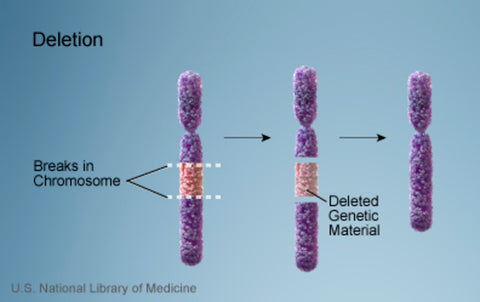
Depiction of a contiguous gene deletion syndrome, like 22q11.2DS, in which a section of genetic material located close together on the chromosome is removed
The deleted portion of the 22nd chromosome contains 30 to 40 genes, the loss of which can affect the development of every system in the human body. Each case of 22q11.2DS presents a different set of symptoms, which can include up to 200 mild to serious health and developmental issues.
What causes 22q11.2DS?
Most cases of 22q11.2DS are not inherited. It is most often a result of a random, de novo mutation in the sperm or egg cell, or caused by a spontaneous mutation that occurs during early fetal development. There is no known prevention of 22q11.2DS in people without a family history of the syndrome.

Illustration of a de novo genetic mutation, typical in affected children with no family history of 22q11.2DS
About 10 percent of individuals with 22q11.2DS inherit the condition from a parent. The inheritance pattern of 22q11.2DS is considered autosomal dominant, meaning if either parent has the syndrome, there is a 50 percent chance of passing it on with each pregnancy.
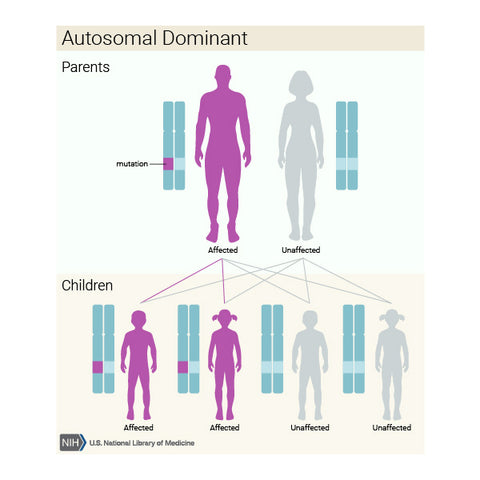
Illustration of an autosomal dominant pattern, showing that children with one affected parent have a 50 percent chance of inheriting 22q11.2DS
The prevalence of inherited cases is expected to rise due to improved survival, thus higher reproductive fitness of individuals with 22q11.2DS. Experts recommend that affected adults receive genetic counseling to discuss the risks and challenges associated with pregnancy.
How is 22q11.2DS diagnosed?
Diagnosis of 22q11.2DS can be challenging because every case presents a different set of signs and symptoms. However, there are typical features present in many infants which prompts targeted testing to confirm deletions on the 22nd chromosome. The most reliable forms of genetic testing are:
- Fluorescence in situ hybridization (FISH): a fluorescent agent binds to the chromosome to help identify its genetic sequence
- Quantitative polymerase chain reaction (qPCR): amplifies the number of chromosomes and evaluates their sequence using radioactive binding agents
- Multiplex ligation-dependent probe amplification assay (MLPA): a newer variation of the PCR
These tests require a small blood sample and typically take between three to fourteen days for confirmation to return.
Signs and symptoms of 22q11.2DS
Since 22q11.2DS can affect every part of the body, and often varies in the range and severity of symptoms, early diagnosis can be difficult. The presence of the following three conditions simultaneously at birth usually prompts a preliminary diagnosis of 22q11.2DS, which must be confirmed with genetic testing:
- Immunodeficiency due to an underdeveloped or absent thymus gland (75% patients)
- Congenital heart defects (75% patients, 40% requiring surgery)
- Hypocalcemia due to hypoparathyroidism (60% patients)
Dysmorphic development of the face, ears, and hands is commonly present at birth, though some features may not be immediately apparent with visual inspection. A study of 103 adults with 22q11.2DS shows the type and prevalence of typical dysmorphism:
- Global dysmorphic facial pattern (100%)
- Eye dysmorphism (84%)
- Ear dysmorphism (77%)
- Nose dysmorphism (76%)
- Facial shape dysmorphism (62%)
- Hand dysmorphism (54%)
- Mouth dysmorphism (46%)
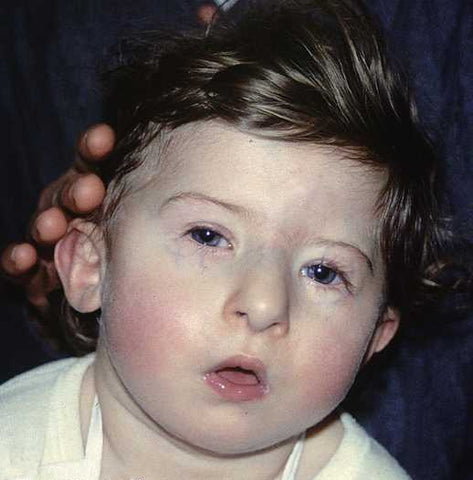
Child with 22q11.2DS presenting associated dysmorphic features
Infants with 22q11.2DS can also present a set of issues which can contribute to difficulty feeding:
- Palatal defects (75%)
- Acid reflux
- Dysmotility due to underdeveloped gastrointestinal tract muscles (35%)
Other early-onset physical anomalies common in patients with 22q11.2DS include:
- Hypernasal speech/crying (90%)
- Chronic middle ear inflammation (47%)
- Hearing loss (44%)
- Scoliosis (45%)
- Low blood platelet count (30%)
- Misaligned eyes (15%)
- Absent or malformed kidneys (10%)
- Enlarged spleen (10%)
Common late-onset physical conditions associated with 22q11.2DS that occur later in life include:
- Obesity (35%)
- Seborrhoeic dermatitis (35%)
- Severe acne (25%)
- Gallstones (20%)
- Noninfectious respiratory diseases (10-20%)
- Kneecap dislocation (10%)
- Enamel deficiency in teeth and chronic cavities
- Varicose veins (10%)
Growth & intellectual development of individuals with 22q11.2DS
Most people with 22q11.2DS have an IQ range of 70-85, which places them in the borderline to low-average classification. Between 30-40% of affected individuals have a mild intellectual disability, with IQs ranging between 55-69. Severe intellectual disability is rare. A minority of individuals have intellect in the average range, although learning difficulties may still be present.
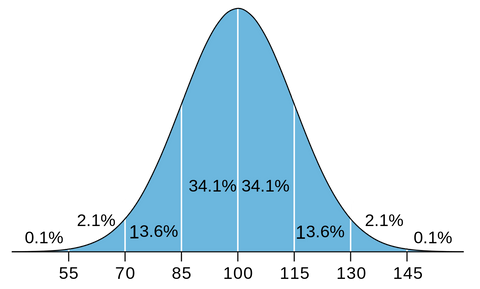
22q11.2DS patients typically have an IQ range of 70 to 85
Adults and adolescents with 22q11.2DS tend to downplay, hide, or deny existing issues. Relatively good verbal skills, despite speech impairment, can make it difficult to know when someone with 22q11.2DS is having trouble understanding communication, life skills (especially at work), and financial management.
Family members should monitor the risk of adults with 22q11.2DS developing financially or emotionally exploitative relationships with friends and romantic partners. Difficulty socializing, poor comprehension, and degraded decision-making skills also make Internet safety a concern.
Many adults with 22q11.2DS lack awareness of their limitations. They will set unrealistic goals and become angry or upset when their expectations are not met. Support from family members and caregivers is important to prevent continued discouragement.
Neuropsychiatric disorders associated with 22q11.2DS
22q11.2DS is one of the most well known genetic risk factors for the development of neuropsychiatric disorders. Multiple studies [1, 2, 3] have found that about 30-56 percent of adolescents and adults with 22q11.2DS meet the criteria for a psychotic disorder.
Schizophrenia
There is a well-established connection between 22q11.2DS and schizophrenia. One in every four to five affected adults develop schizophrenia in late adolescence to early adulthood. This represents a 20-times increase in the risk of developing schizophrenia compared to the general population.
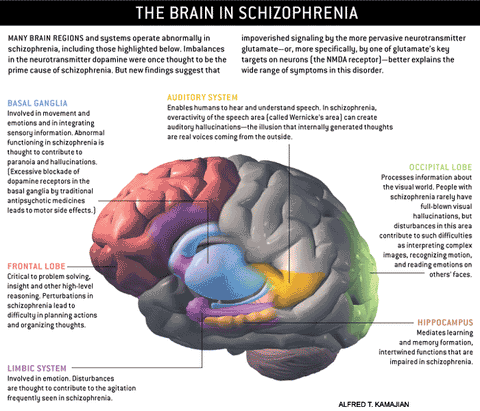
Brain regions affected by schizophrenia and resulting impacts on thought and behavior
Schizophrenia associated with 22q11.2DS is indistinguishable from schizophrenia in the non-22q11.2DS population, apart from a lower average IQ.
While there is a strong connection and high likelihood for a person with 22q11.2DS to develop schizophrenia, other nonpsychotic illnesses are more common, and incidence rates may be much higher than the general population.
Autism spectrum disorder (ASD)
For those with 22q11.2DS, autism spectrum disorder usually onsets during childhood and persists into adulthood. Multiple studies [1, 2, 3] found that about 15-50 percent of children with 22q11.2DS meet the criteria for autism spectrum disorder (ASD).
ASD symptoms in childhood did not predict psychosis in adulthood, meaning if a child with 22q11.2DS has autism, that does not necessarily mean he or she will develop psychosis later in life.
Anxiety disorder
Anxiety and mood disorders are common in adults with 22q11.2DS, sometimes arising in childhood, and sometimes later in adulthood. One study found that 13% of adult subjects with 22q11.2DS had generalized anxiety disorder (GAD), which is a much higher rate when compared to the general population.

James Sant - Courage, Anxiety and Despair: Watching the Battle (1850)
Other disorders
People with 22q11.2DS have been known to develop other neuropsychiatric disorders. However, they are generally the same prevalence as the general population. In one study, researchers found that the prevalence for lifetime major depression (18%), obsessive-compulsive disorder (5%), social phobia (5%), attention deficit/hyperactivity disorder (8%), and substance use disorders (13%) were not significantly different from population estimates.
Single and recurrent seizures (40%, adults) and unprovoked epilepsy (5%) are common throughout life in patients with 22q11.2DS. Magnetic resonance imaging (MRI), electroencephalograms, management of calcium and magnesium levels, and anticonvulsant medication may be required for these conditions.
Seizures can be unprovoked or related to identifiable factors, especially hypocalcemia due to underlying parathyroid dysfunction. Other possible factors include fever, ischemia, hypoxia, surgery, medications, and hyperprolinemia.
Outcomes
Information about long-term outcomes in older patients with 22q11.2DS is limited, with most available data involving individuals in their 30s. Long-term care can be a challenge to elderly parents who are taking care of their adult children. Collaboration between families and social agencies can help mitigate these challenges.
Early-onset Parkinson’s & neurodegenerative diseases
New evidence is pointing to a connection between 22q11.2DS and early-onset (before age 50) Parkinson’s disease. The prevalence of diagnosed Parkinson’s in one study was 6% of patients aged 36 to 64 years. The findings show a much higher rate of Parkinson’s in patients with 22q11.2DS compared to the rest of the population.

Writing by a Parkinson’s disease patient
Patients with 22q11.2DS must consider periodic assessments for Parkinson’s, especially adults who experience a change in motor function. For patients with both Parkinson’s and schizophrenia, antipsychotic drugs with fewer extrapyramidal side effects, such as clozapine and quetiapine, are recommended. Hypocalcemia may induce or aggravate existing tremors, so calcium levels should be closely monitored.
Premature mortality
One study shows that individuals with 22q11.2DS who survive childhood are at increased risk of premature mortality and sudden death, although the cause is not attributable to any single identifiable factor.

The premature death of Archimedes: an immeasurable loss to humanity
Patients with 22q11.2DS who participated in the study had a 90% survival rate to age 40 and 74% lived to age 50. The median age at death was 41.5 years, and the reported causes of death were sudden death (most common), heart failure, stroke, suicide, and post-operative complications. More studies are required to understand the causes of sudden death.
Treatment
There is no cure for 22q11.2DS. However, each complication can be treated or managed on its own using the latest recommended general guidelines and guidelines for adults with 22q11.2DS.
Additionally, CBD has been found to be potentially beneficial for a number of conditions associated with 22q11.2DS:
CBD for cardiovascular health
While CBD cannot fix a congenital heart defect, it has been shown to support cardiovascular health. Nearly all people born with 22q11.2DS must diligently take care of their hearts, and CBD may be able to help.
Medical research has recently associated CBD with multiple heart and circulatory system benefits. CBD may be able to decrease hypertension, or high blood pressure, which is a leading global disease risk factor for stroke and heart attack.
One study showed that a single 600mg dose of CBD reduced resting blood pressure and blood pressure increase due to stress in healthy male subjects. Additionally, a recent mouse study demonstrated that CBD reduced oxidative stress and prevented heart damage in diabetic mice with heart disease.
More studies are needed to determine if CBD can be used as an effective treatment for cardiovascular disorders. So far, it seems that CBD may be beneficial to cardiovascular health by reducing hypertension and preventing heart damage.
CBD for the immune system
The effects of CBD on the immune system are complicated and not fully understood. Scientists are learning how the endocannabinoid system, which interacts with all biological activity, relates to the immune system. Much remains to be discovered, but so far experts believe CBD may play a role in homeostasis or control of the immune system.
Some studies have shown that CBD is immunosuppressant, which may explain why CBD provides relief for those with autoimmune diseases and chronic inflammation. This suggests that the CBD should be avoided by people with compromised immune systems. However, the effect of CBD on the immune system seems to be transient, meaning its inhibitory effects are overcome when the immune system needs to respond to infection. In fact, CBD may have both an inhibitory and stimulatory effect, depending on the circumstance, and may play an important role in balancing the immune system.
CBD for gastrointestinal issues
In normal digestion, food is moved through the digestive tract by rhythmic contractions called peristalsis. This movement is called gastric motility. Many people with 22q11.2DS suffer from a gastric motility disorder, meaning these contractions do not occur in a coordinated fashion, which may cause:
- Difficulty swallowing
- Gastrointestinal reflux disease (GERD)
- Gas
- Severe constipation
- Diarrhea
- Abdominal pain
- Vomiting
- Bloating
Studies have shown that the GI tract is full of cannabinoid receptors that play a role in the secretion and motility of the gastrointestinal system. This in combination with CBD’s analgesic and anti-inflammatory properties make CBD a possible candidate for gastrointestinal relief.
CBD for schizophrenia
There is no known prevention for psychotic illness in people with 22q11.2DS, but early diagnosis and prompt medical treatment may improve prognosis. Antipsychotic and anticonvulsant medications may be necessary, which tend to be only moderately effective and can cause serious metabolic and neurological side effects.
The mechanisms of the antipsychotic effects of CBD are well documented, yet not fully understood. Studies have shown that CBD is able to prevent psychotic-like symptoms produced by high doses of THC. This in turn has led to further studies which have shown that CBD has antipsychotic effects as observed in animal models and in healthy volunteers.
Additionally, CBD was shown to be antipsychotic in open case reports and clinical trials in patients with schizophrenia with a remarkable safety profile. These results support the idea that CBD may be a future therapeutic option for psychosis, and in particular for schizophrenia.
Before using CBD to treat any medical condition, including schizophrenia, a medical provider should be consulted first. Caregivers must pay particular attention to avoid administering CBD products containing trace amounts of THC to schizophrenia patients. THC can cause symptoms of schizophrenia when acutely administered.
The endocannabinoid system has been implicated in psychosis, and further study may lead to a better understanding of the mechanisms of schizophrenia. Although CBD seems to be a safe and effective therapy for people with psychosis, further research is needed to determine the role of CBD in treating psychotic disorders.
CBD for autism
A growing number of parents with children suffering from autism spectrum disorder (ASD) are turning to CBD as a possible remedy. The increase in interest is mainly fueled by anecdotal evidence and sensationalized media reports on its purported benefits. However, virtually no clinical evidence exists showing that CBD is a safe and effective treatment for ASD.
In the past, unproven products such as intravenous secretin and hyperbaric oxygen therapy (HBOT) were widely marketed as alternative therapies for people with ASD. Today, secretin is not recommended as an evidence-based treatment for ASD, and in 2017 the FDA issued warnings to several companies promoting unproven and potentially dangerous products and treatments, including HBOT, chelation therapies, and detoxifying clay baths.
People and companies promoting CBD as an ASD treatment without supporting evidence may one day be listed among the HBOT and secretin hawkers of the past. Only future scientific studies will tell. Ultimately, the decision to try CBD to treat autism lies with the child’s parents.
The World Health Organization and the National Institute on Drug Abuse agree that CBD is “generally well tolerated with a good safety profile” and studies have not identified any significant side effects, parents must use their best judgment when interpreting anecdotal evidence and selecting a safe CBD product to try.
CBD for Parkinson’s and neurodegenerative diseases
Scientists believe that CBD may prove beneficial for people suffering from neurological disorders. There have been several studies on CBD use in treating Parkinson’s disease, epilepsy and multiple sclerosis. The research in this area is still new, yet the studies have shown positive effects.
One study found that Sativex, an oral spray consisting of CBD and THC, reduced spasms in 75% of patients with multiple sclerosis who were experiencing muscle spasticity that was resistant to medications.
Another study gave patients with severe epilepsy a dose of CBD orally every day, and found that the median reduction in monthly motor seizures was 36.5%.
Other research has found that CBD considerably reduced seizures in children with Dravet syndrome, a complex childhood epilepsy disorder that is associated with drug-resistant seizures and a high mortality rate.
For patients with Parkinson’s disease, studies have shown that CBD treatment improved quality of life measures and improved rapid eye movement sleep.
Animal and in vitro studies have shown that CBD may help decrease inflammation and help prevent neurodegeneration associated with Alzheimer’s disease. In one long-term study involving mice, scientists administered CBD to mice genetically predisposed to Alzheimer’s disease, finding that it helped prevent social recognition deficit.
Our 22q11.2DS story
At Wellness Garden Medicinals, we are familiar with the challenges faced by patients with 22q11.2DS and their family members. The founder’s brother-in-law, Nicholas, is an adult in his late-twenties with 22q11.2DS. Nick suffers from many of the complications associated with the syndrome, including severe anxiety disorder.
In the past, Nick took prescription drugs to help manage his anxiety. However, the side effects were so severe, his parents decided it would be better for him to be off medication. When they heard about the anti-anxiety effects of CBD, they wanted him to try it, especially because it has no major side effects.
Wellness Garden Medicinals founder’s brother-in-law Nick has severe food-related anxiety. Here he is in one of his less anxious moments.
Nick currently uses our 1200mg CBD Tincture combined with our Calming & Anxiety Relief Salve daily to help manage his anxiety. He has been using CBD for over a year and has shown significant improvement with no noticeable side effects. Both the frequency and severity of his anxiety attacks have decreased. Also, his overall mood has improved and he is less irritable. In addition, we hope his daily use of CBD will contribute to better heart health and a longer, happier life.
CBD side effects
CBD is generally well tolerated and is considered safe. However, it may cause some minor adverse reactions. The most commonly experienced side effects found in studies include:
- Tiredness
- Diarrhea
- Changes in appetite and weight
CBD has drug interactions with certain medications. Speak to a medical professional about CBD prior to starting any treatment.
One mice study showed that CBD-rich extracts may cause acute liver toxicity. However, it must be noted that some of the mice in the study were administered extremely large doses of the extract.
Conclusion
22q11.2DS is a genetic disorder that causes many health conditions and challenges for patients, families, and caregivers. CBD may be able to help with a number of issues associated with 22q11.2DS. Talk to your doctor before making any changes to your medical treatment plan, and choose a CBD product that you trust for safety and quality.
Is CBD Legal? CBD products derived from hemp and with less than 0.3 percent THC are federally legal in the United States. CBD products derived from marijuana are federally illegal, but are legal under certain state laws. Check your local laws and the laws of anywhere you travel with CBD. Note that non-prescription CBD products are not FDA-approved, and may be inaccurately labeled. All Wellness Garden Medicinals products are made from U.S. hemp and contain 0% THC, which means they are federally legal in the United States.





